In the rapidly evolving landscape of tech startups, AI is fundamentally transforming customer interactions. The a16z Enterprise List has become a benchmark for innovation, highlighting key players that are redefining customer service through AI-powered solutions(Explore how AI is transforming other key areas like Finance, Marketing, and Sales in our ongoing AI Augmentation series). These companies are enabling businesses to deploy AI receptionists and support agents that deliver efficient, personalized service across multiple channels—phone, chat, and email.
For instance, Chima offers real-time, customized support, while Yellow.ai leverages automation for 24/7 high-quality service. Companies like Cresta and Maven AGI are optimizing customer interactions and facilitating more human-like conversations through AI. This shift not only enhances customer satisfaction but also boosts efficiency and strengthens competitive advantage.
However, the integration of AI in customer service isn't without challenges. Data privacy concerns and technology adoption hurdles must be carefully navigated. Let's dive deeper into how these innovative companies are reshaping the customer service landscape.
Key Players in the AI Customer Service Landscape
The a16z Enterprise List showcases a diverse range of companies, each bringing unique strengths to the evolving AI customer service domain. Here's a comprehensive overview of these key players:
Chima

Chima utilizes generative AI to elevate customer interactions. By automating and personalizing responses, Chima delivers swift, tailored support that significantly boosts efficiency and satisfaction. Their robust data analytics provide valuable insights into customer behavior, enabling continuous service improvement.
Crescendo

Crescendo specializes in AI-driven solutions that enhance customer engagement across various platforms. Their focus on conversational AI enables businesses to create interactive, personalized experiences, transforming traditional customer service into dynamic, real-time dialogues.
Cresta
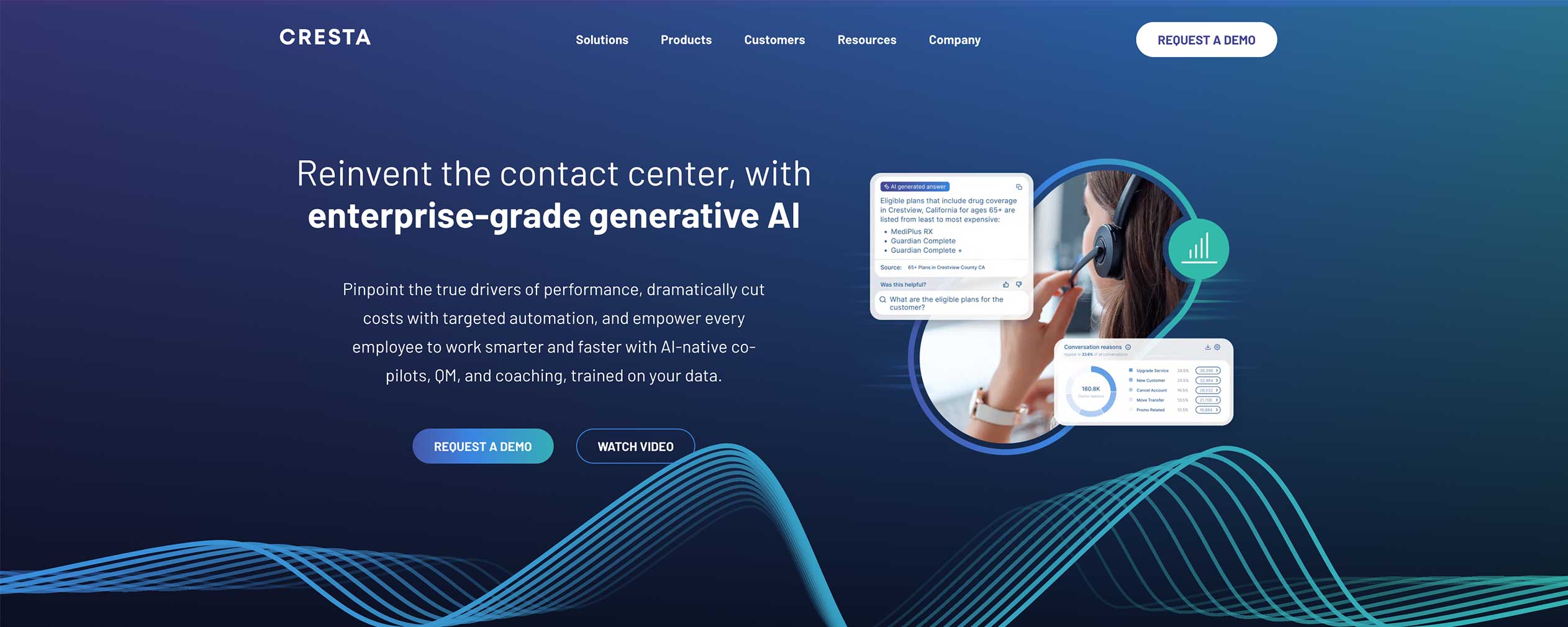
Cresta supports customer service representatives by offering real-time AI-powered suggestions during interactions. This approach enhances agent performance and improves customer outcomes. Cresta's platform continuously evolves, ensuring agents have access to the best tools available.
Decagon
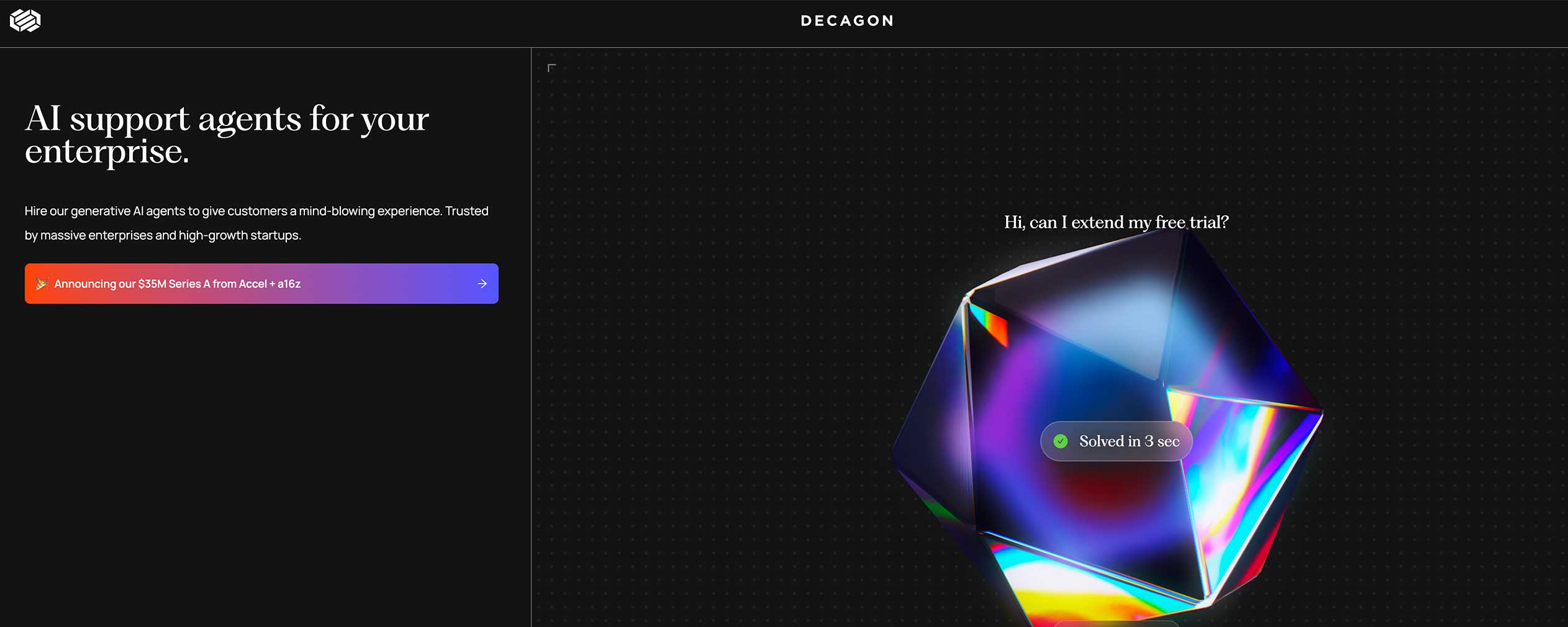
Decagon focuses on automating customer service tasks to enhance efficiency. Their AI solutions enable businesses to manage inquiries more effectively, streamlining processes and reducing response times while improving overall customer satisfaction.
Gradient Labs

Gradient Labs is dedicated to optimizing customer service operations through advanced AI solutions. Their tools analyze customer data to generate actionable insights and enhance service workflows, resulting in more personalized service experiences.
Maven AGI
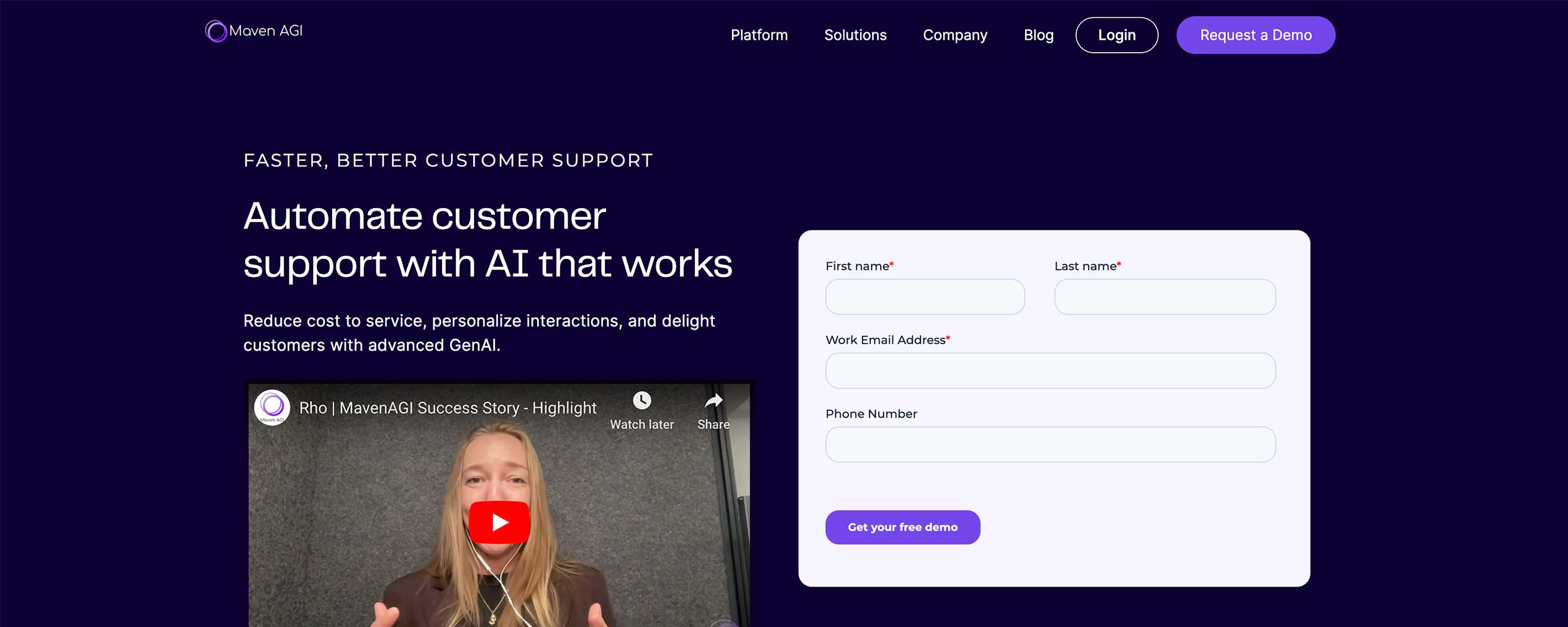
Maven AGI develops sophisticated AI systems that enhance customer interactions through intelligent automation. Their platform is designed to understand customer intent and provide accurate, timely responses, allowing human agents to focus on more complex issues.
Pylon

Pylon offers AI-driven tools aimed at automating customer service functions across multiple channels. Their solutions integrate seamlessly with existing systems to enhance service delivery and reduce operational costs.
Rasa
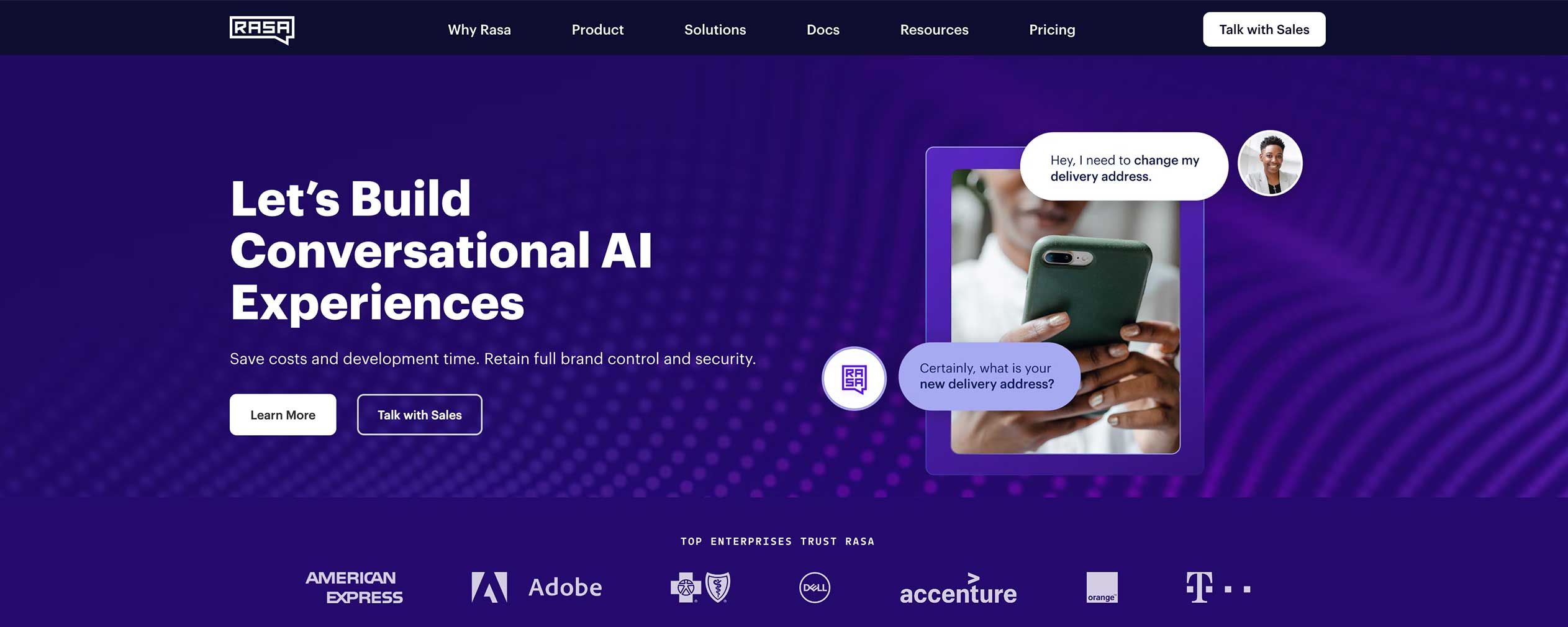
Rasa leads in open-source conversational AI, empowering businesses to build custom chatbots and virtual assistants. Their platform allows for extensive customization, enabling companies to tailor AI interactions to their specific needs.
Sierra

Sierra delivers AI-powered solutions designed to streamline customer service processes. Their platform integrates various communication channels, ensuring a consistent experience across phone, chat, and email.
Slang.ai

Slang.ai specializes in AI-driven communication tools that facilitate seamless interactions between businesses and customers. Their platform emphasizes natural language understanding, promoting more intuitive conversations.
Yellow.ai
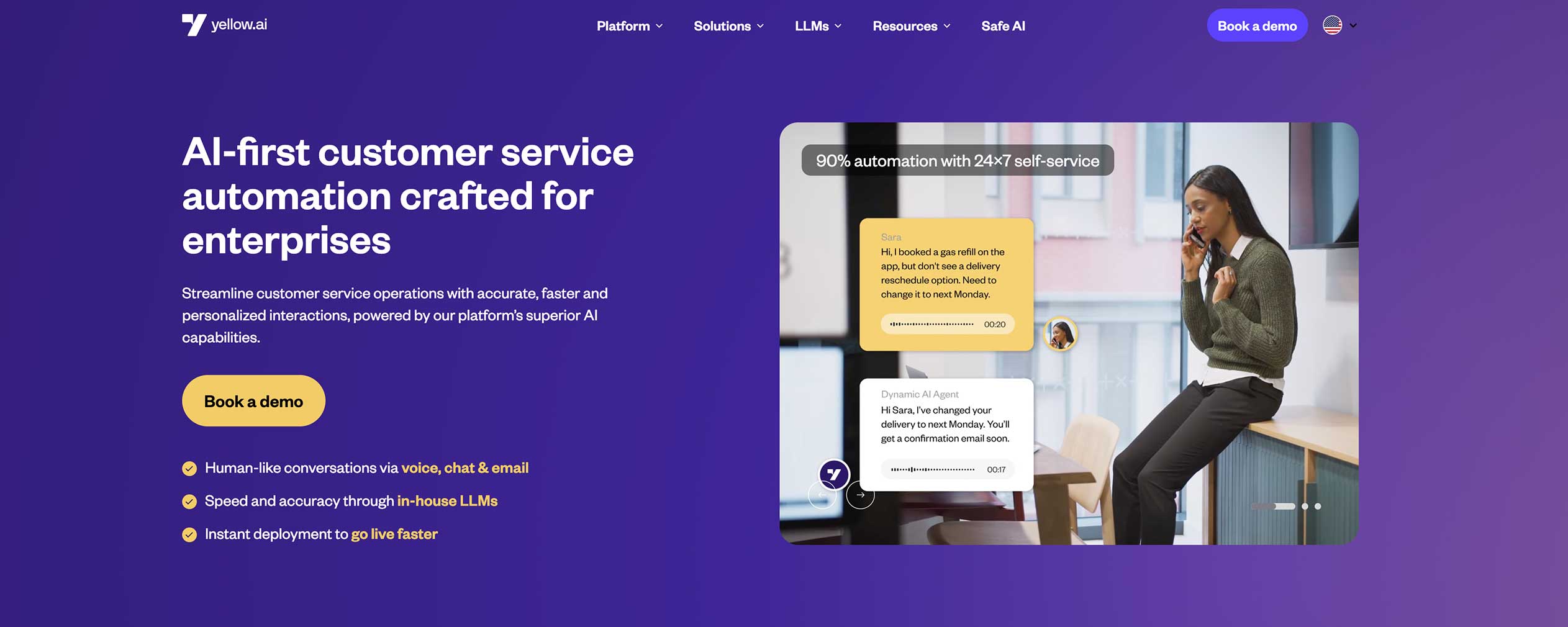
Yellow.ai provides a comprehensive conversational AI platform that automates customer service across multiple channels. Their technology enables businesses to handle inquiries 24/7 with personalized responses, significantly improving efficiency and customer satisfaction.
These companies represent the forefront of innovation in AI customer service, each contributing uniquely to a landscape that is rapidly evolving to meet the needs of modern consumers. From generative AI to open-source platforms, these startups are pushing the boundaries of what's possible in AI-driven customer support.
The Technology Behind AI Receptionists
As AI continues to revolutionize customer service, the technologies powering AI receptionists are becoming increasingly sophisticated. At the core of this transformation are advancements in natural language processing (NLP) and machine learning (ML).
Natural language processing serves as the backbone of AI receptionists, enabling them to interpret and generate human language. Through NLP, these systems can analyze the nuances of customer queries, discern intent, and provide relevant responses. This capability is crucial for creating conversational agents that can handle complex interactions while maintaining a natural flow of dialogue.
Rasa, a leader in open-source conversational AI, exemplifies the power of NLP. Their platform empowers businesses to build highly customizable chatbots capable of engaging customers in meaningful conversations. Rasa's emphasis on understanding context and intent ensures that interactions are not only efficient but also contextually relevant.
Machine learning complements NLP by enabling AI receptionists to learn from past interactions and improve over time. This adaptability is essential for enhancing the accuracy of responses and optimizing service delivery. AI systems analyze vast amounts of data, identifying patterns and trends that inform their decision-making processes.
For example, platforms like Maven AGI and Cresta utilize ML to refine their algorithms continuously. This enhances the ability of AI agents to respond accurately to customer needs while learning from user feedback. As these systems become more intelligent, they can provide increasingly personalized support, tailoring responses based on individual customer histories and preferences.
The integration of NLP and ML allows for a seamless customer experience across multiple channels. AI receptionists powered by these technologies can operate efficiently on various platforms, such as chat, email, and voice, ensuring consistent service delivery regardless of the medium. This multi-channel capability is critical in today's customer-centric environment, where users expect prompt and effective support at any time.
Challenges and Considerations
While the benefits of AI in customer service are significant, the implementation of these technologies is not without challenges. Businesses must navigate several key issues:
-
Data Privacy and Security: As AI systems process vast amounts of customer data, ensuring the privacy and security of this information is paramount. Companies must comply with data protection regulations and implement robust security measures to maintain customer trust. Read more about data privacy concerns.
-
Initial Investment and ROI: The upfront costs of implementing AI solutions can be substantial. Businesses need to carefully evaluate the potential return on investment and consider both short-term and long-term benefits.
-
Integration with Existing Systems: Seamlessly integrating AI solutions with existing customer service infrastructure can be complex. Ensuring compatibility and smooth data flow between systems is crucial for success.
-
Employee Adoption and Training: Introducing AI into customer service operations often requires significant changes in workflow. Employees may need extensive training and support to effectively work alongside AI systems.
-
Maintaining the Human Touch: While AI can handle many tasks efficiently, preserving the empathy and nuanced understanding that human agents provide is essential. Striking the right balance between AI and human interaction is a key challenge.
-
Continuous Improvement and Maintenance: AI systems require ongoing refinement and updates to remain effective. This necessitates a commitment to continuous learning and adaptation of the technology.
Strategic Takeaways for Businesses
As businesses explore the integration of AI into their customer service strategies, several key insights emerge:
-
Start Small, Scale Gradually: Begin with pilot projects and gradually expand AI implementation based on real-world feedback and results.
-
Prioritize Data Quality: Ensure that the data used to train AI systems is high-quality, diverse, and representative of your customer base.
-
Focus on Customer Experience: Use AI to enhance, not replace, the human elements of customer service. The goal should be to improve overall customer experience.
-
Invest in Employee Training: Prepare your workforce for the integration of AI. Provide comprehensive training and emphasize how AI can augment their roles.
-
Stay Informed and Agile: Keep abreast of new developments in AI technology and be prepared to adapt your strategies as the field evolves.
-
Address Ethical Concerns Proactively: Develop clear policies around AI use, data handling, and transparency to build trust with customers and employees.
-
Measure and Iterate: Regularly assess the performance of your AI systems and be ready to make adjustments based on customer feedback and operational metrics.
Conclusion: The Future of AI in Customer Service
The integration of AI in customer service, as exemplified by the companies on the a16z Enterprise List, represents a significant shift in how businesses interact with their customers. From Chima's generative AI to Yellow.ai's 24/7 support bots, these innovations are setting new standards for efficiency, personalization, and customer satisfaction.
As AI technologies continue to evolve, we can expect even more sophisticated and seamless customer support solutions. The future of customer service lies in the effective combination of AI efficiency and human empathy, creating experiences that are not only more efficient but also more engaging and satisfying for customers.
Businesses that successfully navigate the challenges of AI implementation and leverage its benefits will be well-positioned to lead in this new era of customer service. The key to success will be a strategic approach that balances technological innovation with a deep understanding of customer needs and preferences.
In conclusion, the AI revolution in customer service is not just about automation—it's about augmentation and transformation. It's about creating super-powered customer service teams that can handle more queries, solve problems faster, and ultimately deliver exceptional experiences that drive customer loyalty and business growth.
References
- UiPath | Overcoming AI Adoption Barriers
- HubSpot | AI Concerns in Customer Service
- Amplitude | AI Impact on Customer Privacy
- Rasa | Rasa Community
- Salesforce | AI in Customer Service
- Giselle | AI's Not Stealing Your Job, It's Pimping Your Career
- Giselle | The Top 10 AI Text Generators in 2024
- Giselle | AI in Content Creation: Innovations, Challenges, and What’s Next
Please Note: This content was created with AI assistance. While we strive for accuracy, the information provided may not always be current or complete. We periodically update our articles, but recent developments may not be reflected immediately. This material is intended for general informational purposes and should not be considered as professional advice. We do not assume liability for any inaccuracies or omissions. For critical matters, please consult authoritative sources or relevant experts. We appreciate your understanding.
